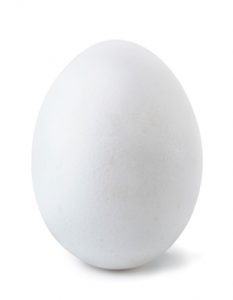The Amazing Egg
Chock-full of the many nutrients our bodies require to grow and thrive, humans have been eating eggs for thousands of years. Rich in protein, the USDA includes eggs in their food pyramid as “Meats and Alternatives,” and Canada’s Food Guide equates two eggs to being one serving of meats and alternatives.1

The Egg White
An egg’s albumen (the egg white) makes up 66% of the egg’s liquid weight. It is clear to cloudy in colour and contains 57% of the eggs protein. It also contains almost all of the egg’s magnesium, potassium, niacin, and most of the riboflavin. In the past, egg whites have been touted erroneously as the only “healthy” part of the egg because they are cholesterol-free and fat-free.2 On top of the nutritional benefits of egg whites, their functional purposes from a baking perspective have long been relished. The light foam generated by beating egg whites is essential for many baking products including meringues, soufflés, angel food cake, and sponge cakes.3
The exploitation of egg whites in the food and nutra-pharmaceutical industries is well known. The egg yolk, on the other hand, has been vastly under-utilized. This is due, in large part, to the limitations of existing technology. It has simply been too difficult and costly to extract, separate, and isolate the yolk’s unique ingredients. However, Ecovatec Solutions Inc. has developed ground-breaking technology that now makes this possible. We are able to not only effectively break open the amazing benefits encased within the yolk, but to do so without using harmful chemicals or high temperatures. This results in purer and less denatured yolk ingredients.
2. Health Science experts have now shown that there is bad cholesterol and good cholesterol. The type found in egg yolk is of the good variety. This will be discussed more in the following section. http://www.cholesterol-and-health.com/Egg_Yolk.html
The Overlooked Egg Yolk
The yolk is the yellow center of the egg, making up 34% of the egg’s liquid weight. While the albumen is fat-free and cholesterol-free, it is also free of many of the essential vitamins, minerals, and oils that the yolk is packed full of. The yolk contains 100% of the fatty acids of the egg, as well as all of the egg’s vitamins: A, B6, B12, E, D, and K.4 The yolk also contains all of the egg’s omega 3 fatty acids (essential for brain and eye development and function) and the omega 6 fatty acids (used in skin and hair production, and needed most by children and breastfeeding mothers).5 What makes the egg yolk so special is that this golden nucleus houses so many of the essential building blocks of life for the developing chicken.6

4. Vitamin K is touted as the “forgotten vitamin,” because it provides nutritional benefits on par with the mighty vitamin B’s and D’s of the vitamin world.
5. http://www.cholesterol-and-health.com/Egg_Yolk.html
6. Rainer Huopalahti et al., Bioactive Egg Compounds (Berlin: Springer, 2007), 1.
The Components of Egg Yolk
A yolk is made up of 32% lipids (fats), 17% proteins, and 51% water. The proteins in egg yolk are 69% lipovitellins, 12% livetins, 7% phosvitin, and 12% high-density lipoprotein. The protein profile of egg yolk makes it an excellent source of nutrients for the human body. The biological value of egg proteins is said to be even more valuable than those of milk proteins. The lipids in egg yolk are 65% neutral lipids, 30% phospholipids, and 5% cholesterol. Egg yolk provides a great deal of lipids that are necessary for nutrition and health, especially the phospholipids, which contain the omega 3 fatty acid – critical for brain function.7
Valuable Liquid Yolk Components
Egg yolk has long been vilified for its cholesterol and fat content. The cholesterol in yolk was for many years thought to lead to heart disease.8 At the time, high blood cholesterol had been linked to heart disease, which led many people to discard the yolk in favour of egg whites only, thinking that the cholesterol in yolk caused high cholesterol in your body. Recent studies have shown that food cholesterol is not the true culprit for increased blood cholesterol, but in fact, food high in trans and saturated fats are much more likely to blame. Instead of contributing to high cholesterol and the thickening of artery walls, egg yolks have actually been found to contain many nutrients that actually help prevent heart disease, including protein and vitamins B12 and D.9


 A Canadian Company
A Canadian Company